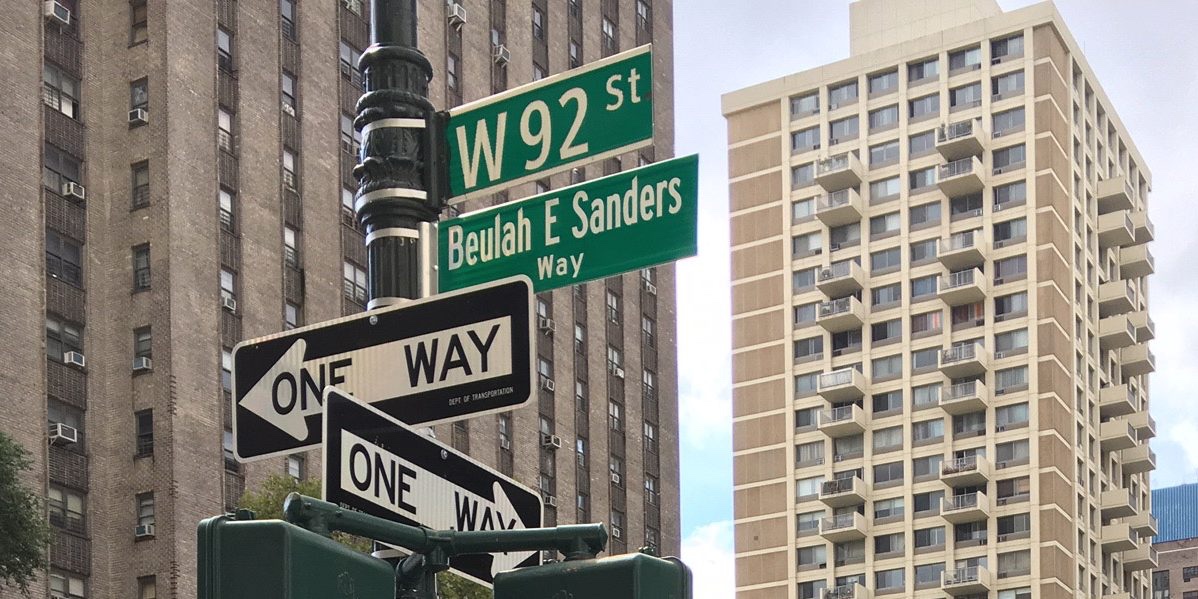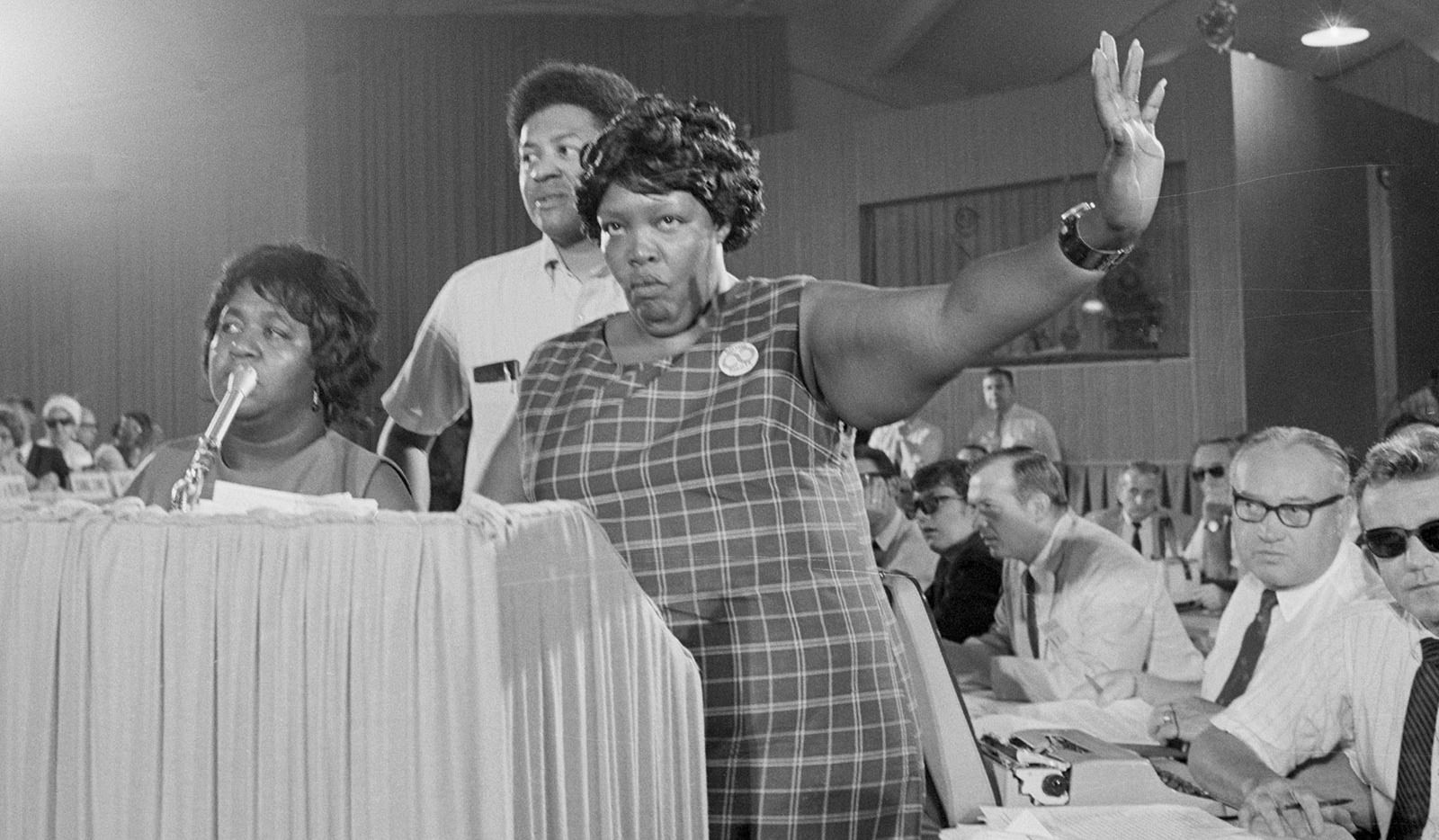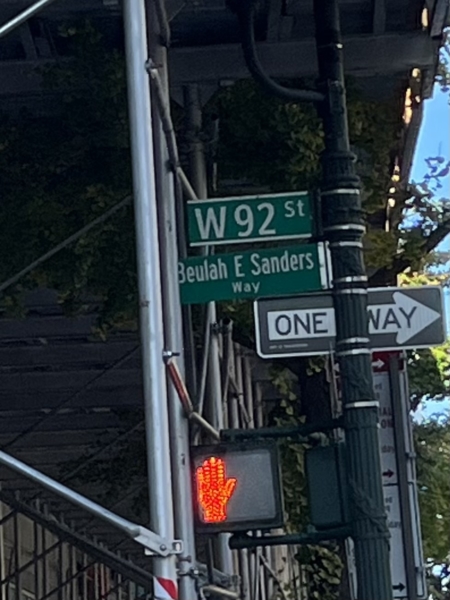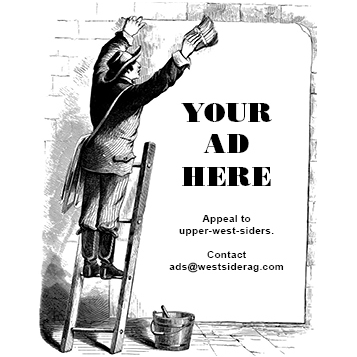
The latest in an ongoing WSR series about “secondary street names,” the people and process behind them.
By Lisa Kava
In 2019, Beulah Sanders’ daughter Judy described her mother as a woman on a lifelong mission to help others. “Everyone who came into her life, no matter if you needed a bed, food, shelter, my mother was there,” Judy Sanders told a gathering led by The People’s Forum, a group that works with marginalized and working class communities. “We made room for everyone. That is what my mother was about. Helping people, she loved to help people, she helped so many people.”
Judy Sanders was speaking at a celebration that marked the naming of a block of West 92nd Street between Columbus and Central Park West Beulah E. Sanders Way (you can see the street sign at the northwest corner of 92nd and Columbus Avenue). It was Judy who led the petition drive to rename the street where her mother once lived in honor of Beulah, whose legacy goes well beyond the people she fed and sheltered in her own home.

In the 1960s and 1970s, Beulah Sanders was a feisty welfare rights activist and organizer. As chair of the Citywide Coordinating Committee of Welfare Groups, she was a key welfare rights leader in New York City and became a founding member and vice president of the National Welfare Rights Organization (NWRO), which brought together hundreds of smaller local groups like the one Sanders led here. Many of the members of NWRO were single, urban mothers, and 85% of them were black. But the organization spoke on behalf of all poor people, always noting that the majority of the poor in the U.S. were white.
In 1967, on a day of pouring rain, Sanders led hundreds of people to City Hall in New York, where they asked to see Mayor John Lindsay to press their demands for greater rights for welfare recipients. “We want to be treated like human beings” and “More Money Now,” read some of the signs carried by the crowd. The mayor refused to meet with them. “The one way not to meet with the mayor is to demonstrate in front of City Hall,” he told a press conference that day, before going off to a luncheon with Chamber of Commerce officials.
Sanders, known as a “revolutionary of the working class,” was not daunted by the mayoral rebuff. She was active in the 1968 Poor People’s Campaign, organized by Martin Luther King Jr., and marched in Washington fighting for the economic rights of poor Americans. She was credited with helping educate Dr. King about the welfare system and making welfare part of his platform.
In a 1969 letter to the editor of the New York Times, Sanders responded to critics who said a welfare mothers’ school boycott she had helped organize was using children as pawns for their advocacy. The critics had it wrong she said. “Governor Rockefeller and the state legislators who voted to cut our welfare grants and to take away clothing allowances for our families are the people who made pawns of our children.” Mothers wanted their children to go to school, she said. “But for this, adequate school clothing is necessary. When our children do not have decent clothes to wear to school they drop out.”
That same year she announced that welfare recipients would organize a “dump Rocky” campaign aimed at blocking the governor’s reelection. The Times noted that in the past, her coordinating committee “has managed to raise considerable commotion despite limited resources.”
Sanders took her “take-no-prisoners” advocacy to Washington in 1969 when she testified before President Nixon’s Commission on Income Maintenance. She proposed increases in the minimum wage and in benefits to families receiving federal aid – the kind of aid to poor and working-class families that was regularly opposed by Mississippi Sen. James Eastland. Noting that the senator accepted federal agricultural subsidies, she said “the few thousand a year paid to poor mothers to support their kids was peanuts,” and “it is not poor mothers who insist on getting a free ride on the taxpayer’s money. The real welfare deadbeats are men like Eastland.”

In proposing that New York City name a street after her mother, Judy Sanders wrote: “History has a bad habit of forgetting lesser historical figures of the past. My mother, Beulah Sanders was one of them. She was one of the founders of the National Welfare Rights Organization that was key in making sure that people who truly needed the assistance of the government would get everything they needed to support their families until they get back on their feet.” Then, at the 2019 celebration of the naming of Beulah E. Sanders Way, Judy noted: “We are still fighting today for housing, jobs, we are still fighting for the same things today that she fought for then.”










Wonderful, thank you (to both) yMs. Sanders!
I am proud to live on the street named after a true hero whose efforts no doubt improved the lives of countless city families- your mother.
Powerful photo, and nice article! Not sure if I missed it, but what’s the connection between Sanders and W 92nd? Did she live there? Work there?
She lived there, on 92nd between Columbus and Central Park West. That information got dropped due to an editing error. Thanks for asking!
Thank you Beulah Sanders! And thank you to her daughter Judy for getting the street named in her mom’s honor.